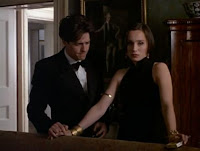There are a lot
of people out there for whom the film will require no introduction,
such was its absolute domination in British popular culture in the
mid-90s. It made a star out of Hugh Grant and raised Wet Wet Wet to the
status of pop gods after the film's sound track included 'Love is all
around' - which then spent the whole of the summer of 1994 at position
#1 in the UK singles charts. The film's title explains its structure.
We follow Hugh Grant and his lower / middle / upper London society
friends as they free-load their way through 4 weddings and 1 funeral.
It's a series of 5 short vignettes, each beginning shortly before the
event with Hugh Grant (playing Charles) swearing merrily as he struggles to arrive on time. At each
event we see a little more about the connections between the characters,
and learn that Charles worries he will never find the woman of his
dreams, that he will never have his 'thunderbolt' moment when he falls
in love. At wedding 1, Charles meets the mysterious American Carrie
(Andie MacDowell), after wedding 4 doesn't pan out as planned, Charles
and Carrie have their 'thunderbolt' moment. The end.
This
film is seminal for many people - but not for me. Far too many head-scratching oddities about the story. It is never clear why this group of
people of different ages and backgrounds are friends. Perhaps it's meant to reflect the political rhetoric of 90's Britain in which John Major
called for a post-class society? It's hardly representative of British society though. Why did they include a mute character
as Charles brother? He brings much needed heart to the story, but
having conversations in sign language slows the pace of the film down at
crucial moments. It certainly nails the film as one that wants all-inclusive Britain in the modern age ensuring everyone is represented. But doing this to the detriment of your story-telling is extraordinarily careless.
The
most glaring oddity is the final 5 minutes. There are 3 specific things that
happen in the final 5 minutes that undercut much of any prior
enjoyment. The first is Charles and Carrie kissing in the rain - Andie
MacDowell's line "I hadn't noticed it was raining" is one of the most
jarringly poor moments of acting I've ever seen in a major motion
picture. Perhaps the line itself is the issue, and MacDowell's problem is that
she's trying to work out how to deliver it without sounding like she's
reading the script. Whatever - it takes you out of the drama immediately. The
second is the literal thunderbolt we hear when Charles and Carrie declare their
love in the rain. I know that we have been told Charles has been
searching for his 'thunderbolt' moment all his life - but seriously: if you look up the meaning of weather in fiction 1-0-1, it says thunder = bad. If someone says something and then thunder and / or
lightening happens, it means THIS IS BAD. This casual misuse of the
language of storytelling is perhaps more jarring even than Andie
MacDowell's inability to deliver bad dialogue. The third thing is that
the most sympathetic character in the film, played by the best actor in
the film (Kristin Scott Thomas as Fiona), is revealed in the closing montage as the only character who ends
up with no one despite previously declaring her life-long love for Charles.
So we have bad acting, bad use of audio effects and a bad epilogue. What hope for love Richard Curtis?
So the message of the
film is that people who demonstrate heartfelt love are doomed to live a
single life? Or perhaps the thunderbolt that accompanies Charles and
Carrie kissing really should be taken as a bad omen. After all Carrie
spends the night with Charles after wedding 2, when she is already with
her future husband of wedding 3 - perhaps she's not as loyal as Charles imagines. Perhaps their time together will be as short-lived like all
Charles' other relationships? Perhaps the message is that pining for
your 'thunderbolt' moment stops you seeing what's in front of your
eyes? Perhaps the film's not quite as superficially about love as most
of its fans in the 1990s imagined?
Or maybe
it's simply a feel-good movie that reflected the cultural dynamics of
the era, put its handsome young leading man in a series of good suits at
weddings, didn't think very hard about its plot / structure and came out on top by rinsing a pop track until everyone was sick to death of
hearing it. Anyway, I wouldn't go too far out of your way to watch it. Watch Black Mirror instead. Seriously.

